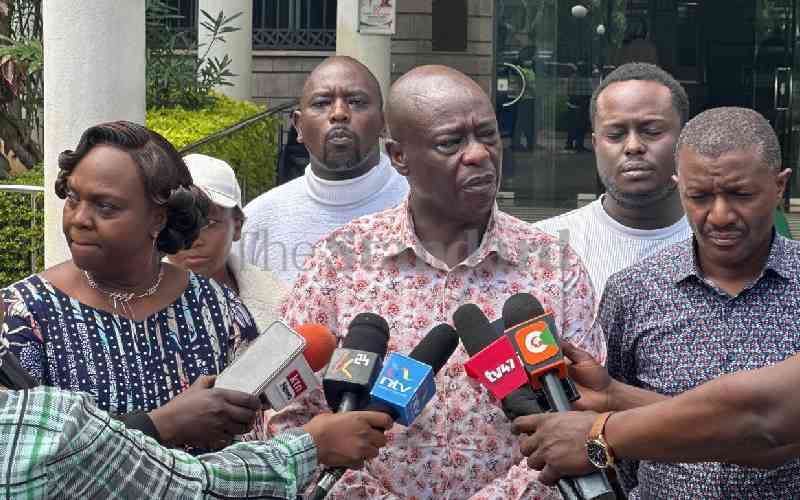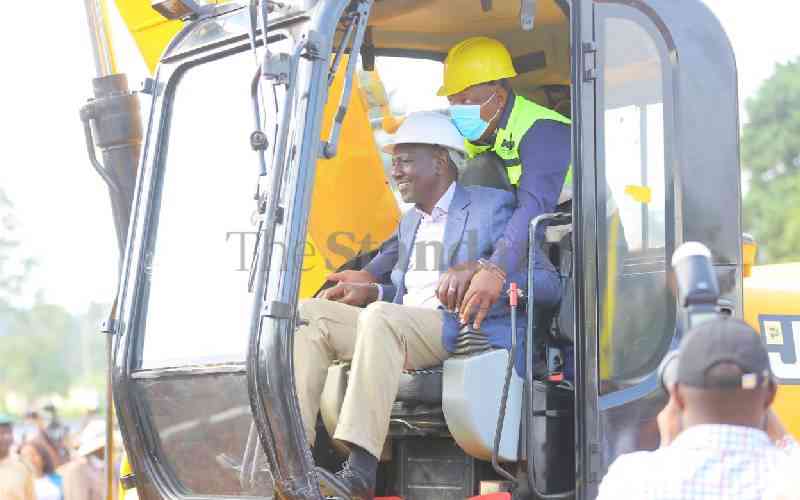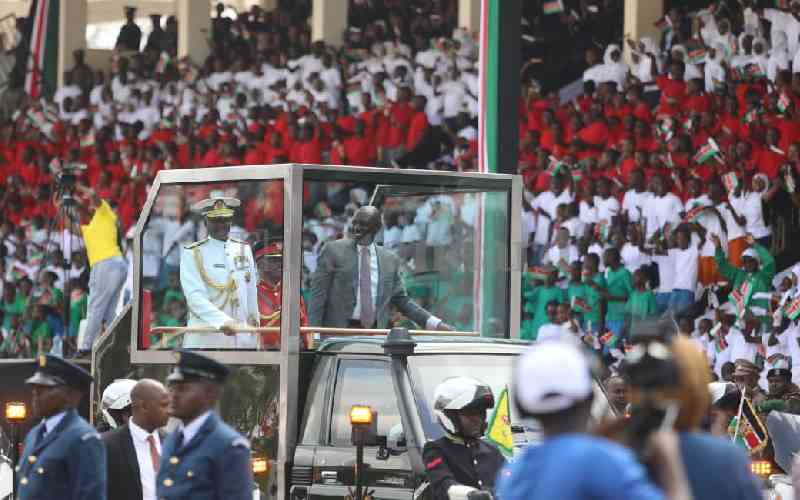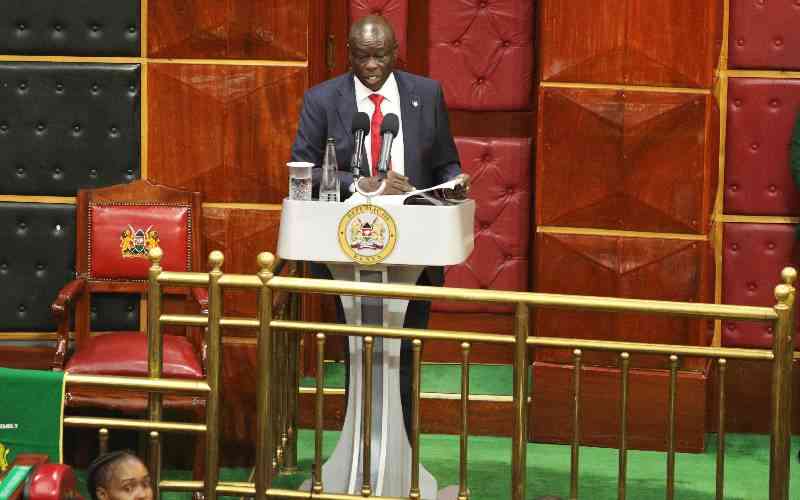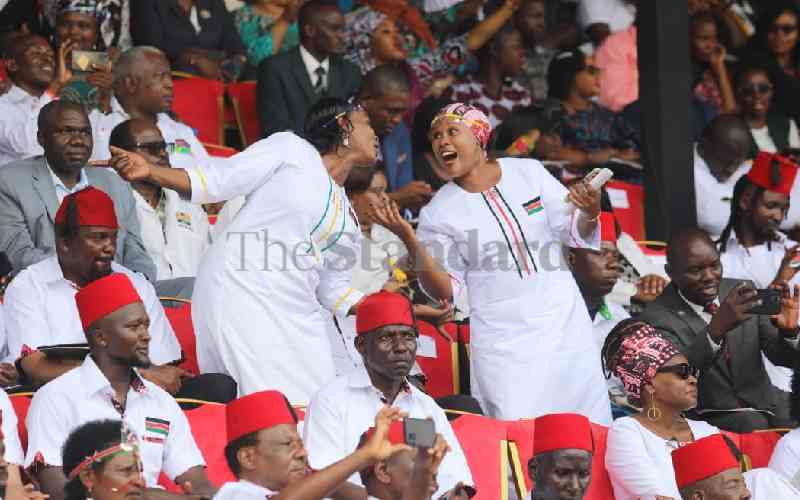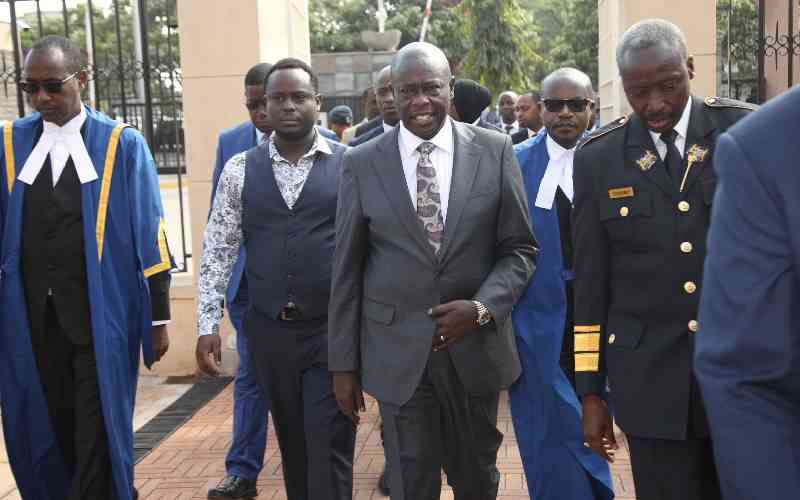
Did the Independent Electoral and Boundaries Commission (IEBC) play any role in the appointment of the Deputy President nominee Kithure Kindiki?
And could President William Ruto and Senate Speaker Amason Kingi have jumped the gun as they hurriedly replaced Rigathi Gachagua without following due process?
The IEBC is responsible for verifying the suitability of presidential candidates and their running mates before official nomination by their respective political parties to vie for office. But did the commission play this role?
National Assembly Speaker Moses Wetangula, told Parliament on October 18, 2024 that Prof Kindiki received the necessary approvals and clearance from the Kenya Revenue Authority, Ethics and Anti-Corruption Commission, Higher Education Board, the Credit Reference Bureau and IEBC among others.
Critics however, questioned how these processes including the gazettement of Gachagua’s removal could have been done in less than 10 hours after the impeachment vote by the Senate in the dead of the night on October 18, 2024.
A former IEBC chairman told The Standard that the role IEBC plays in replacing a deputy president is purely administrative, although it is also crucial.
“IEBC comes in after the vote and so the interpretation of the Constitution begins from that point after the text has been presented. The law provides that the president sends the nominee’s name to Parliament, which is free to contact anybody for vetting, including IEBC,” said the former officer.
Lawyer Danstan Omari, however, thinks IEBC should have played a central role after the impeachment because the process is not supposed to be any different from what happens when the president and his running mate take oath of office after getting elected on one ticket.
“Let Kenyans be very clear on this issue, because the replacement and assumption of office of the DP is the same as that of the president. It is supposed to be gazetted and the oath taken between 10 am and 2pm,” says Omari.
He argues that framers of the Constitution gave enough time of 14 days within which a name shall be nominated by the president after declaration of the vacancy by the Senate, and another 60 days for debate in Parliament.
That, he therefore argues means that the position of deputy president is supposed to be elective and not an appointive one, the latter being the process that Parliament used when replacing Gachagua last week.
“The deputy president once nominated by the president, becomes an elected person and the question that arises thereafter is who is going to verify that nominee. It is only the IEBC that then checks if they have dual citizenship, they are in the voter’s register, they are above 35 years and other requirements,” says Omari.
From the foregoing, he thinks the country now has a constitutional lacuna because President Ruto and Gachagua not only presented their documents to IEBC together but they were both cleared at the same time and are still tied at the hip if due process of removal has not been followed.
Omari further argues that it is the responsibility of IEBC to declare a vacancy within 14 days, which never happened after the Senate vote because the responsibility was immediately taken over by the president.
On Friday, the National Assembly debated among other issues the role of public participation and the timelines through points of order raised by members. After consideration by the House Business Committee that retreated to make a decision, the House proceeded to vote for Kindiki’s approval through a vote.
Omari however, insists that more time should have been taken to discuss the nominee’s approval because Parliament has 60 days to do that and thereafter approve the name by a two thirds majority, a threshold that is disputed by some lawyers.
“Parliament has laid a precedent that any constitutional matter that is discussed must go through public participation, which should go to the polling station where the deputy president was voted for,” he says.
Senior Counsel Charles Kanjama, however, argues that constitutional time lines like the 14 days for nomination and 60 for approval were included in the constitutional architecture to avoid extended periods of vacant state offices.
“The challenge however is about the process. Is it just about the voting by the MPs or does it have to involve the people?” Poses Kanjama.
He is more inclined to the school of thought that subscribes to Article 118 of the Constitution, which says any action taken by Parliament whether legislative or otherwise, must involve vetting by the people who should also be allowed to give their views before the nominee appears before a vetting committee.
Kanjama however, notes that there are two schools of thought among legal experts, the first holding that the deputy president’s office is elective and the mere fact that he has been removed by impeachment does not turn it into an appointive one.
Such action, therefore just changes the manner of voting from the original action by the people themselves directly to the new position of a vote taken by their representatives in Parliament.
“They argue that vetting should not be done in the manner you nominate state officers but should instead follow the process taken in presidential polls, and that is why IEBC is required to verify and validate that the nominee qualifies for election into office, as it also supervises the process,” says Kanjama.
Legal experts also say because article 149 is all inclusive, it is unnecessary to go through IEBC and it is therefore upon the MPs to decide what to do without consideration for public participation as applied in appointive offices.
Article 149 states: “Within 14 days after a vacancy in the office of the deputy president arises, the president shall nominate a person to fill the vacancy and the National Assembly shall vote within 60 days after receiving it.”
Those supporting it argue that the wording in provision 149 is quite different from the one which deals with the article that deals with provisions of appointing Cabinet and Principal Secretaries.
Another group also argues that once the deputy president is removed, the replacement should come in primarily through an appointive process similar to the one used when appointing state officers who are merely selected and approved by the National Assembly.
Former Cabinet Secretary and lawyer Eugene Wamalwa, argues that the nomination process of Kindiki was flawed because Gachagua was elected by seven million Kenyans.
“Why did the law provide for 14 days? It is because when you nominate someone who is supposed to be elected by the people, you don’t just leave it to elected representatives. Before a vote is taken, the nominee must be verified and approved by IEBC and it must be done in broad daylight,” says Wamalwa.
He doubts that between midnight when Gachagua was impeached and in the morning when the letter of his nomination was processed by clerks at Parliament for Speaker Wetangula to read, the president was able to get approval from IEBC, which still has no commissioners.
Wamalwa believes there is more than meets the eye because the president could not have been able to meet all KRA, EACC officers and other institutions to get Kindiki’s clearance by morning.
“You have 14 days and you take less than ten hours. Look at how Parliament was hurried. What should have taken 60 days to approve took less than 10 hours. Why the hurry, where is Kenya going. Is it because one man had said he needed a new deputy by Sunday before Mashujaa day?” Poses Wamalwa.
He argues that the Senate should have given Gachagua more time because the 14-day period was only limited to a select committee and not the whole House sitting in plenary.
The Director Centre for Multi – Party Democracy Franklin Mukwanja thinks the presidential election ticket needs an overhaul to avoid succession battles that can lead to more impeachments in future, a precedent now set by President Ruto.
“We admired the current system of having a security of tenure for the deputy president because it takes a quasi-legal and legal process to remove them. Now it is no longer done through a roadside declaration. It also brought some sense of stability in the presidency because of the joint ticket,” says Mukwanja.
But to tame overzealous deputy presidents and create harmony in the presidency, he suggests that the law should be changed so that they are not allowed to vie for office to succeed their bosses.
“Because of the our nature of our politics the deputy president has to first fund the campaign budget and then also increase the vote basket for the candidate,” says Mukwanja.
And how will Kenyans create a mechanism that removes the conflicting ambitions?
Mukwanja suggests that any serving deputy president be directed to take a sabbatical before returning later so that they are not part of the succession politics and that will also tame the scope of their authority and how fat they can go.
“It happened between Uhuru Kenyatta nd Ruto, although the former handled it differently, probably because of conflict avoidance or he just didn’t want a messy in his politics. May be it was also because it was his second term and he was therefore only keen on his legacy and agenda,” he says.
 The Standard Group Plc is a multi-media organization with investments in media platforms spanning newspaper print
operations, television, radio broadcasting, digital and online services. The Standard Group is recognized as a
leading multi-media house in Kenya with a key influence in matters of national and international interest.
The Standard Group Plc is a multi-media organization with investments in media platforms spanning newspaper print
operations, television, radio broadcasting, digital and online services. The Standard Group is recognized as a
leading multi-media house in Kenya with a key influence in matters of national and international interest.

